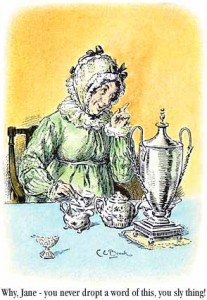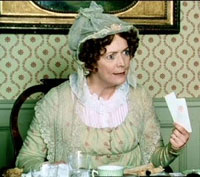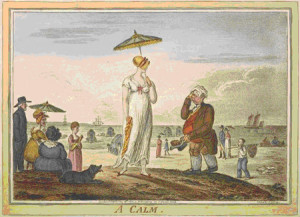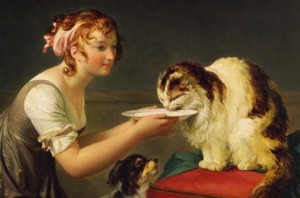And happy Mother’s Day to all the mothers reading this. I thought I’d share a blog originally published at Heroes & Heartbreakers for Mother’s Day 2011.
 Mothers don’t often fare well in Jane Austen’s world. In fact, many have been buried by the time we meet their offspring. Emma Woodhouse’s mother has been long gone by the time we meet her managing younger daughter and, as Persuasion begins, Lady Elliot is a mere memory to poor Anne, left to contend with her self-involved father and sisters.
Mothers don’t often fare well in Jane Austen’s world. In fact, many have been buried by the time we meet their offspring. Emma Woodhouse’s mother has been long gone by the time we meet her managing younger daughter and, as Persuasion begins, Lady Elliot is a mere memory to poor Anne, left to contend with her self-involved father and sisters.
Of the living, in Mansfield Park, Fanny Price’s slatternly mother has sent her off to live with her aunts and uncle, most of whom see her as unpaid help (if they see her at all). In Sense and Sensibility, poor Mrs. Dashwood is deprived of her entailed home and comfortable income after the untimely death of her husband and goes to live in a cottage where she pretty much gives over the role of caretaker to Elinor, her eldest daughter.
Catherine Morland appears to have a loving and reasonable mother (a rarity among Austen mothers), but we don’t see much of her. She sends her daughter off with friends to visit Bath and then to Northanger Abbey. When, later, Catherine is unceremoniously dumped in a coach and sent home in the middle of the night, Mrs. Morland greets her with open arms and puts her expulsion from the abbey in the best possible light
“Well,” continued her philosophic mother, “I am glad I did not know of your journey at the time; but now it is all over, perhaps there is no great harm done. It is always good for young people to be put upon exerting themselves; and you know, my dear Catherine, you always were a sad little scatter–brained creature; but now you must have been forced to have your wits about you, with so much changing of chaises and so forth; and I hope it will appear that you have not left anything behind you in any of the pockets.”
This Mothers’ Day, however, we are sending flowers to Pride and Prejudice’s Mrs. Bennet of Longbourn, mother of five daughters, possessor of frayed nerves and querulous arguments, future mother-in-law to Fitzwilliam Darcy.
“Why?” you ask. Why send flowers to Mrs. B? She’s one of the most annoying creatures in all of Jane Austen’s novels, an assessment with which her long-suffering husband would probably agree.
Had Elizabeth’s opinion been all drawn from her own family, she could not have formed a very pleasing picture of conjugal felicity or domestic comfort. Her father, captivated by youth and beauty, and that appearance of good-humour which youth and beauty generally give, had married a woman whose weak understanding and illiberal mind had very early in their marriage put an end to all real affection for her. Respect, esteem, and confidence had vanished for ever; and all his views of domestic happiness were overthrown.
Yes, that Mrs. Bennet, the best mother in all of Jane Austen’s novels. Sure, she’s not the brightest candle in the chandelier. I imagine her voice to be like Alison Steadman’s in the 1995 Pride and Prejudice (the one with Colin Firth): high and screechy. She’s enough to drive her husband to the library with his glass of claret, and she makes the more intelligent of her daughters wince. Yet, she’s a mother who has the interests of her children at heart.
In a time when the state of women was inextricably tied to their husbands and in a household where there was not sufficient money for reasonable dowries for five girls, and living in an estate that will go to a distant cousin on the death of her husband, Mrs. Bennet wants to get her girls married and married well. How else can she take care of them?
Mrs. Bennet assumes that Mr. B. will pop off before she does, although he reassures her, “My dear, do not give way to such gloomy thoughts. Let us hope for better things. Let us flatter ourselves that I may be the survivor.”
She doesn’t get a lot of support from that quarter. Within this household, the ditzy mother is the one who’s worried about her daughters’ future. For some reason, Mr. Bennet seems quite sanguine about the whole thing.
Granted, Mrs. Bennet does not go about the business of getting her daughters married off in the best of all possible ways. She tries to get Mr. Bennet to make Elizabeth marry Mr. Collins, the obsequious heir to Longbourn:
She would not give him time to reply, but hurrying instantly to her husband, called out as she entered the library, “Oh! Mr. Bennet, you are wanted immediately; we are all in an uproar. You must come and make Lizzy marry Mr. Collins, for she vows she will not have him, and if you do not make haste he will change his mind and not have her.”
And when her youngest runs off with the ne’er-do-well Mr. Wickham without benefit of marriage, she first reacts in a typically Mrs. Bennetish manner:
Mrs. Bennet, to whose apartment they all repaired, after a few minutes conversation together, received them exactly as might be expected: with tears and lamentations of regret, invectives against the villanous conduct of Wickham, and complaints of her own sufferings and ill-usage; blaming everybody but the person to whose ill-judging indulgence the errors of her daughter must be principally owing.
She recovers admirably when Lydia is recovered and a marriage is effected: “My dear, dear Lydia!” she cried. “This is delightful indeed! She will be married! I shall see her again! She will be married at sixteen! My good, kind brother! I knew how it would be. I knew he would manage everything! How I long to see her! and to see dear Wickham too?”
When Elizabeth snags the big one, Mrs. B. is not to be repressed:

”Good gracious! Lord bless me! only think! dear me! Mr. Darcy! Who would have thought it? And is it really true? Oh, my sweetest Lizzy! how rich and how great you will be! What pin-money, what jewels, what carriages you will have! Jane’s is nothing to it — nothing at all. I am so pleased — so happy. Such a charming man! — so handsome! so tall! Oh, my dear Lizzy! pray apologise for my having disliked him so much before. I hope he will overlook it. Dear, dear Lizzy! A house in town! Everything that is charming! Three daughters married! Ten thousand a year! Oh, Lord! What will become of me? I shall go distracted.”
Yes, Mrs. Bennet, you’re a silly woman. You’re a trial to your husband and an embarrassment to your daughters but you’re a mother through and through. You want what’s best for the girls (and if that happens to be what’s best for you as well, that’s just icing on the cake) and by the end of the book you have three daughters married. Happy Mother’s Day. Go buy yourself something nice. You know the best warehouses.
 We have been on and off since I indulged in some extreme gardening a few years ago. Having fallen flat on my back while ripping up English ivy, it was–oh my gosh, it was like Marianne and Willoughby in better weather. With his assistance I could stand and he flung me onto the back of his stallion and rode with me back to safety, me nestled in the comfort of his warm cloak, inhaling his masculine woodsy scent of lime and tobacco and beer and all that. Well, sort of. I’m a bit nervous of sniffing Dennis after the very hot weather where you sweat in strange places, like the back of the knee.
We have been on and off since I indulged in some extreme gardening a few years ago. Having fallen flat on my back while ripping up English ivy, it was–oh my gosh, it was like Marianne and Willoughby in better weather. With his assistance I could stand and he flung me onto the back of his stallion and rode with me back to safety, me nestled in the comfort of his warm cloak, inhaling his masculine woodsy scent of lime and tobacco and beer and all that. Well, sort of. I’m a bit nervous of sniffing Dennis after the very hot weather where you sweat in strange places, like the back of the knee.







